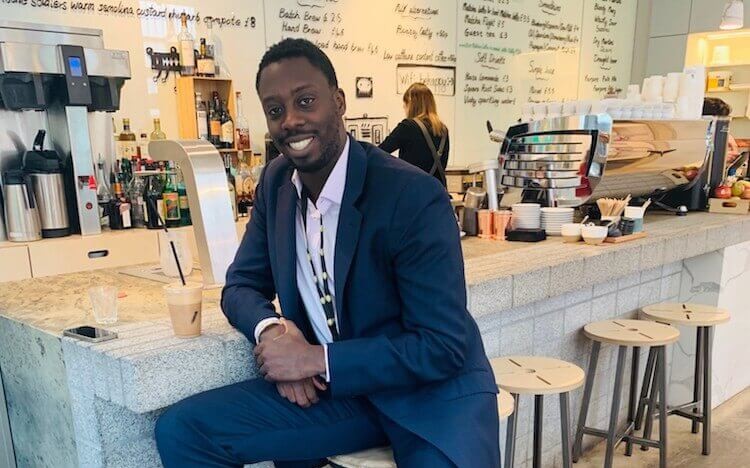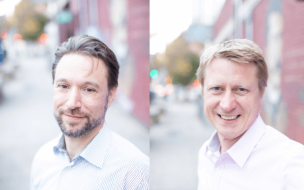Abdoul Aziz Ba had always felt a pull towards leadership roles, starting with his time working in Egypt for a Panafrican financial institution.
“During my time in the bank, I was fortunate enough to learn from some of the brightest minds of the continent who had an interest in developing Africa by designing and creating innovative solutions,” he explains.
“All of them suggested that if one day, I wanted to be a leader, I would need to develop new skills in terms of communication, design thinking, and problem solving.”
For Abdoul, this meant looking for a graduate business degree to gain some of those advanced skills, and he started considering an MBA program.
Abdoul admits that he had been following triple-accredited Hult International Business School “for many years,” but he started to think seriously about applying to their Global One-Year MBA after reading about the annual Hult Prize, an international business competition that aims to tackle some of the world’s most challenging social issues.
Abdoul saw his leadership drive, ambition, and desire to make a community impact reflected in the goals of both the Hult Prize and the business school in general.
“As an African, the school intrigued me.” Abdoul explains. “Hult really focuses on entrepreneurship and impact investing, which are aligned with my values and overall vision for developing the African continent.”
“The goal of Hult is clear,” he adds, “create the next generation of global and innovative leaders.”
An inspiring MBA program
Hult’s one-year MBA program immediately throws students into the world of social impact with the first module, entitled ‘Business and Global Society,’ which focuses broadly on sustainability and corporate social responsibility.
From day one of this class, Abdoul knew he was in the right place to develop his own long-term leadership and social impact goals. “At Hult, students are exposed to current global issues and understand the various dilemma each stakeholder is confronted to.
“CSR and sustainability are two important topics that I believe that are no longer options, but rather musts for any company. The class allowed us to put ourselves in the shoes of a CEO and understand the challenges they must face either from society or from their shareholders.”
The Hult MBA was ranked the 15th best international one-year MBA in the world in 2017 by Forbes. Hult’s student body is comprised of students from over 160 nationalities, and graduates of the class of 2017 came from industries as varied as the media, healthcare, technology, and manufacturing, making the typical MBA classroom “a great way to network,” Abdoul says.
Abdoul had the opportunity during his MBA to meet Fortune 500 industry leaders “almost on a monthly basis” thanks to networking events. “It was extremely beneficial to meet these entrepreneurs, as they provided great advice on how they overcame the obstacles they had to face in their careers,” he explains.
Abdoul is based in London. But Hult also offers students the chance to rotate to up to two of its international campuses later in the program, giving MBAs the chance to study in three global cities like San Francisco, Boston, New York, London, Shanghai, and Dubai.
“The global campus rotation is a great opportunity to learn about other cultures as well as create a global network,” Abdoul continues.
Achieving business dreams
Although initially Abdoul was interested in simply securing a top leadership position in a financial institution post-MBA, through his experience at Hult he’s also started to broaden his professional horizons.
“As my MBA progresses, I understand that I have more to offer,” he muses. “My deep understanding of African issues in relation to the rest of the world allows me to think outside the box and to propose some solutions to the issues the African continent are facing.”
At Hult, Abdoul co-founded the Food, Culture, and Business Club (FCB), using this as a way to investigate and expand his growing interest in the agricultural sector.
“Today, Africa has most of the arable lands in the world; yet it remains the poorest continent in the world,” he explains. “Revolutionizing the agriculture sector in Africa will have major positive outcomes for the population.”
Ultimately, Abdoul says, it’s Hult’s combination of a belief in positive impact and its international environment that will ensure he’s ready for the next step in his career.
“Hult specifically look for motivated and ambitious students who aspire to become global leaders while leaving a positive footprint in their communities or on a bigger stage,” Abdoul explains.
“I hope to be part of a new wave of young Africans who see investing in agriculture as a top priority; completing the MBA at Hult gives me the chance to achieve my dream.”
RECAPTHA :
95
1b
63
31







